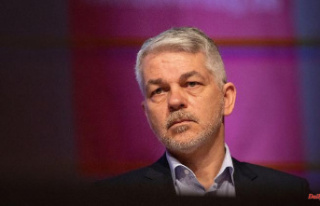Not many eligible voters are changing their minds this summer. There are only minor changes in the RTL and ntv trend barometer. However, it shows who a relative majority would like to have as chancellor.
According to the new trend barometer from RTL and ntv, a majority of Germans would like Robert Habeck as Chancellor. According to the survey conducted by Forsa, 31 percent would vote for the popular Green politician and economy minister if they could directly elect the head of government. With that he trumps incumbent Olaf Scholz and CDU leader Friedrich Merz. Compared to the two opponents, Scholz would have 26 percent, the opposition leader 17. Habeck would only have a relative majority. In a direct comparison with Merz, on the other hand, Scholz does significantly better. 40 percent would choose the SPD politician, 18 percent stayed with Merz. However, that is three percentage points less for Scholz than in the previous week.
Otherwise, the polls for the parties this summer are as motionless as a beach vacationer resting in the sun. Only in the case of the FDP, approval is slowly melting away. The liberals are only 6 percent in the survey - one percentage point lower than in the previous week. Two weeks ago, the party still had eight percent. The SPD, on the other hand, feels a slight breeze and is now back at 20 percent, after 19 in the previous week. However, these changes should not be overinterpreted, since the statistical margin of error is 2.5 percentage points.
The Union is still the strongest force with 26 percent, right behind are the Greens with 24 percent approval if the federal elections were on Sunday. The left is bobbing at 5 percent, the AfD at 9 percent. The traffic light coalition thus has about the same share of voters as last autumn. However, the Greens have had the strongest poll results for months. In the general election, they got only 14.8 percent, the SPD, on the other hand, 25.7.
People in the country are currently primarily interested in energy prices (69 percent) and the war in Ukraine (63 percent). After that, nothing comes for a long time and then the Corona crisis (23 percent). At least 4 percent consider the wedding of finance minister Christian Lindner to journalist Franca Lehfeldt to be the hot topic of the past week.
On the question of the supply of heavy weapons, there is still a majority in favor. According to the survey, however, approval is declining somewhat. In the previous week, 56 percent found this correct, now it is only 52 percent. Greens (73 percent) and FDP (71 percent) have the greatest approval, followed by SPD (61 percent) and Union (59 percent). In contrast, 78 percent of AfD supporters reject them. This corresponds to the mood in East Germany, where almost two-thirds are against the delivery of heavy weapons. In the West, they support 56 percent.
In line with their concerns about the energy supply, voters are also looking at the economy. 78 percent believe the situation will get worse. That's just down from last week, when 80 percent were pessimistic. That was the highest value since the beginning of the war at the end of February. Overall, however, little has changed on this issue - especially since the changes are also within the statistical error tolerance.
For the data on party preference, chancellor question and economic outlook, 2,509 people were interviewed by Forsa between July 12 and 18. The error tolerance is 2.5 percentage points. On the issue of arms shipments, 1,009 eligible voters responded to a second poll between July 15 and 18. The error tolerance was 3 percentage points.
More information about Forsa here.
Forsa surveys commissioned by RTL Germany.












